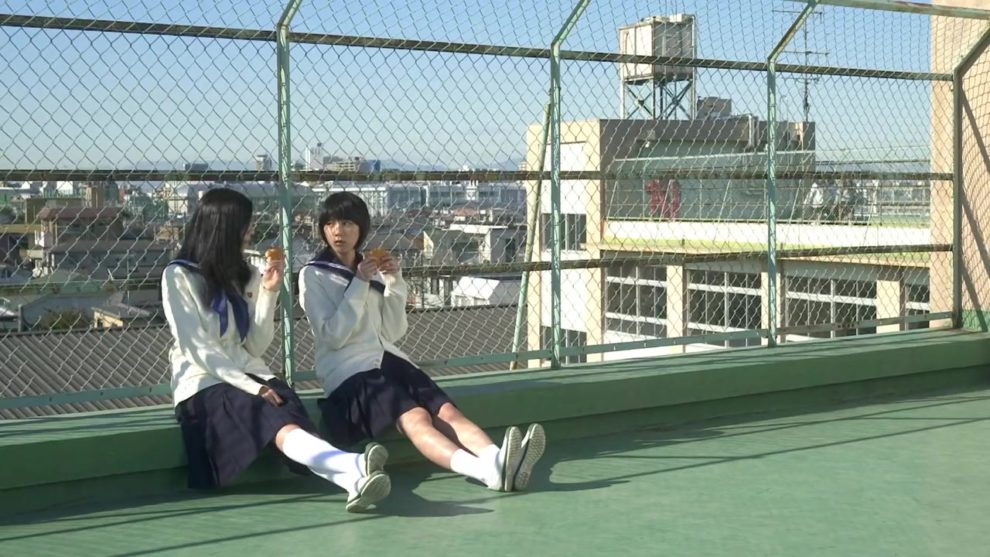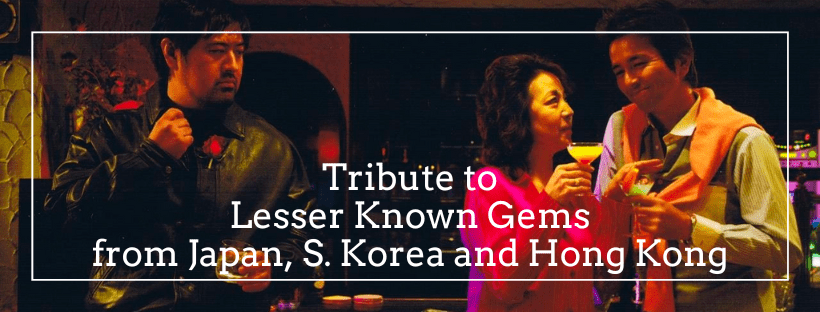The combination of family drama and quirky comedy has always been dominant in the Japanese movie industry, with a plethora of titles following the rules of the category. Thus, it is always interesting to find movies that manage to truly stand out. “Good Morning Everyone” (aka G'mor evian!) is definitely one of those titles, although not for the inclusion of punk music as the promotion of the title insisted, but for the comments it makes and its rather likable characters.
Hatsuki is a fifteen year old student who lives with her mother, Aki, who had her when she was seventeen with a man the former has never met. Aki used to be in a punk band and is the type of mother that is more a friend with her daughter, than a parent, with the switching in roles frequently taking place. Yagu is a young man who was the lead singer of the band, and now is Aki's boyfriend, although he has been away for some time, spending the money he got from an accident settlement, traveling around the world. He loves both women, but is also an intense slacker, with no money, no job, and not much of a future, at least in practical terms; essentially a man child. Aki loves him very much, and so does Hatsuki, as her narrations to Tomo, her best friend from school who idolizes both, highlight. At the same time though, she is annoyed by the lack of parenting from her mother, a sentiment that becomes even stronger when her homeroom teacher, Ogawa, asks her to bring her mother to school for a consultation regarding her future studies, and she declines due to lack of time. Hatsuki begins to feel that her mother's relationship with Yagu is leaving no time for her, and in her adolescent, self-centered way, decides on a rather radical solution, which eventually also brings Ogawa in their apartment.
Toru Yamamoto directs a comedy about three rather interesting characters, who seem to go much further away from what the norm is in Japanese society, and particularly the “ideal way” of going to a good school, a good university, getting a good job and having a good family in the end. This aspect is chiefly represented by Ogawa, while the fact that Aki wants her daughter to follow whatever path she was, even outside of this norm, becomes evident in the discussion between the two, which is actually followed by an intense fight, in the most impactful scene in the movie.
At the same time, the film unfolds as a coming-of-age for Hatsuki, who eventually realizes her self-centeredness and how things can be quite different than what they appear on the surface, and thus eventually maturing. This accomplishment, however, does not come without struggle, tears and tension, something that actually applies to all her relationships, including Tomo and an elderly woman who is kind but also rather annoying. These two comments, about the alternative path in life and misunderstanding people, are essentially the ones driving the narrative, with the way Yamamoto both presents them as issues and provides a solution, being ideal. Particularly the comment about how people whom you don't like deserve your love just because they love and care for you, emerges as one of the best parts of the whole movie, with the finale of the story, and the rather memorable live performance in the end cementing it in the best fashion.
Lastly, the narrative trick of presenting much of the story through Hatsuki's narration to Tomo works excellently here, in a rather smart approach to the presentation of the story.
The last scenes are also the ones where the production values find their apogee, with DP Takashi Komatsu capturing the claustrophobic/suffocation sense the little apartment emits, particularly through Hatsuki's point of view, the beauty of the scenery by the river in the night, and the energy of the live performance in the best fashion. The editing, which results in a relatively fast pace, is also quite fitting for this type of narrative, while Takeshi Hayama's punk rock music is quite pleasant to the ears, even if it is mostly presented in the last part.
Yo Oizumi as Yagu fills the screen with his flamboyant acting and loud voice, Kumiko Aso as Aki is quite convincing in her effort to balance being a mother, a professional, and the girlfriend of a punk rock singer, while Ayaka Miyoshi highlights her inner struggle, smartness and immaturity in the best fashion. The awards she won from Mainichi and Yokohama are well deserved, while the acting in the movie, and particularly the chemistry of the three, are among its best traits.
“Good Morning Everyone” is a genuinely Japanese, but also quite easy to watch and rather entertaining spectacle that definitely deserves a watch by anyone who wants to both have fun and food for thought from a movie.

















